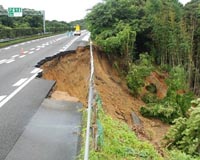| . |  |
. |
Tokyo (AFP) Aug 13, 2009 When a powerful earthquake hit near Tokyo this week, many Japanese instantly shared the same dreaded thought -- that "the big one" had struck to bring death and devastation on a massive scale. The worst fears of millions did not come true this Tuesday morning. But the powerful tremor centred 170 kilometres (105 miles) from the Japanese capital -- the world's largest urban area with 35 million people -- was a sobering reminder that a catastrophic earthquake is decades overdue. The quake, which US seismologists measured at 6.4, was only "a rehearsal for us in preparing for a bigger, real disaster", said one resident, fisheries official Masaki Yamada, in the port of Yaizu near the offshore epicentre. The experts agree. The Earthquake Research Committee warns of an 87 percent chance that a magnitude-eight earthquake -- 100 times more powerful than this week's tremor -- will strike the same region within the next 30 years. For the neighbouring Kanto plains, home to Tokyo's vast urban sprawl, the chance of a major quake of magnitude seven for the same period is 70 percent, said the government agency, which revises the probabilities every year. The last time a "big one" struck Tokyo was in 1923, when the Great Kanto Earthquake claimed more than 140,000 lives, many of them in fires. Previously, in 1855, the Ansei Edo quake also devastated the city. Japan, located on the tectonic crossroads known as the "Pacific Ring of Fire" and dotted with volcanoes, is one of the world's most quake-prone countries, and Tokyo is located in one of its most dangerous areas. The megacity sits on the intersection of three continental plates -- the Eurasian, Pacific and Philippine Sea plates -- which are slowly grinding against each other, building up enormous seismic pressure. Small quakes are felt every day somewhere in Japan, and people take part in regular drills at schools and workplaces to prepare for a calamity, such as the 1995 Kobe earthquake that killed more then 6,400 people. Many buildings have been reinforced since the 1980s while families are urged to keep quake survival kits at home, official tremor alerts can be sent via mobile phones and parks and schools are sign-posted as quake shelters. Japan's high level of earthquake preparedness is seen as part of the reason the casualties and damage from Tuesday's quake were low compared to that caused by similar tremors in many other parts of the world. One woman was found dead in her home under a pile of books that fell on top of her, and eight more people were seriously injured, but most of the 123 reported casualties suffered only minor injuries. Nearly 5,200 buildings were damaged, but few of them very badly. A nuclear power plant, factory assembly lines and bullet train services all went into automatic shut-down when the earth started shaking. Concern, however, has focused on whether the quake was a harbinger for a "big one" in the Tokai region, which has not seen such a quake in 150 years and where many people have bolted their furniture to floors and walls. Japan's Meteorological Agency quickly concluded that the "seismic activities are not linked to the predicted Tokai quake," Takashi Yokota, chief of the agency's quake prediction division, told a press conference. But other seismic experts remained cautious and said the strong tremor, the second in two days, could be an ominous sign of worse to come. "I believe that all the seismic activity seen in the area in recent years has been leading up to ... the Tokai earthquake," said Shozo Matsumura of the National Research Institute for Earth Science and Disaster Prevention. "If the energy that would cause the Tokai quake has already reached the critical point, (Tuesday's) earthquake could act as the trigger." Katsuhiko Ishibashi, a seismologist with Kobe University who first warned of the risk of a Tokai quake 30 years ago, told the Yomiuri daily: "The quake might have accelerated activities that would lead to the Tokai quake." Kishie Shigekawa, an expert of urban disaster prevention at Fuji Tokoha University, called for thorough preparations. "The Tokai quake would be so massive that in many ways we could not do enough to be adequately prepared," she said. "But Tuesday's tremor proved again that good preparation and information sharing at the town and community level still works to minimise the damage. We need to do the same for the big one." Share This Article With Planet Earth
Related Links Bringing Order To A World Of Disasters When the Earth Quakes A world of storm and tempest
 Strong quake felt in Tokyo
Strong quake felt in TokyoTokyo (AFP) Aug 13, 2009 A strong earthquake hit central Japan, including Tokyo, at 07:49 am (2249 GMT) Thursday, the Japan Meteorological Agency said. The 6.7-magnitude quake struck in the Pacific Ocean, some 325 kilometres (202 miles) southeast of the capital, according to the US Geological Survey. The Japanese weather agency did not issue a tsunami warning, however. ... read more |
|
| The content herein, unless otherwise known to be public domain, are Copyright 1995-2009 - SpaceDaily. AFP and UPI Wire Stories are copyright Agence France-Presse and United Press International. ESA Portal Reports are copyright European Space Agency. All NASA sourced material is public domain. Additional copyrights may apply in whole or part to other bona fide parties. Advertising does not imply endorsement,agreement or approval of any opinions, statements or information provided by SpaceDaily on any Web page published or hosted by SpaceDaily. Privacy Statement |